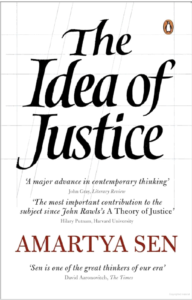
Basic Deatils
The Author of the Book: Amartya Sen
Total Pages: 496
Publication House & Year: Penguin Book Ltd(2010)
Book Review:
The author has dedicated his book to John Rawls for his contribution in the development of “Theory of Justice”.
Rawls tried to prove ‘Justice as Fairness’ with Liberty Theory and Different Principles. He argues with rationality and reasonability based on a veil of ignorance,where you as a womb don’t know anything about sex, religion, economic status but you desire and expect just a fair world outside.
Here in this book, Author criticised Rawls Fairness as a differential principle and tried to give a more comprehensive basic factor of justice. Sen talked about Capability Approach. According to him, the well-being of the person should be evaluated on the basis of their Capability. The principle of Capability refers to the set of valuable functionings that a person has effective access to. Thus, a person’s capability represents the effective freedom of an individual to choose between different functioning combinations – between different kinds of life – that she has reason to value.
Examples of functioning are such diverse things as working, resting, being literate, being healthy, being part of a community, being able to travel, and being confident. Functionings “together constitute what makes a life valuable” and are “constitutive of a person’s being”.
With evolving societies & increasing complexities; we are supposed to fulfil the demands of our nation with universal & International standards keeping the core value of human rights at policy formulations. There has been a paradigm shift in redefining Human Rights in the 21st century.
In the present time we need to have a constructive debate, discussion at individual, civil society level keeping the diversity and practices of different communities, ethnic groups, tribals, vulnerable sections of society(children, women, LGBTQ+, PVTGs). Along with this, it’s time to recognize, respect & implement all the laws which intend to redefine justice based on capability and to ensure human rights of individuals in letter & spirit. Not only this; there are different vulnerable sections of society like widows, their children, old age people, rights of transgender & people/their relatives suffering from human right violation at jail or being falsely accused & not getting the right to express their innocence.
In the same way, state administration should expand its capabilities in order to bridge trust and credibility of function. Thus it needs Police and Judicial Reform. It is also required to have Prison Reformation, Rehabilitation and Reintegration.
Sen beautifully demonstrates the general problem of finding a definition for justice in a world where people see fairness as that which is most beneficial to them. He quotes Shakespeare’s “King John”:
Well, whiles I am a beggar, I will rail
And say there is no sin but to be rich;
And being rich, my virtue then shall be
To say there is no vice but beggary!”
Sen therefore makes a strong case for seeing the world with open-mindedness and from multiple points of view (In a Shakespearean way, maybe!), in order to establish not only a social contract for basic human rights, but the best possible freedom of choice for every single individual. What convinces me most in this context is that he is completely realistic about the discrepancy between a utopian, perfectly just world and the real state of affairs. He urges the reader, however, not to give up the fight for gradually enhanced justice just because perfect justice is not achievable at the moment. Achievement in one area will lead to a better, more stable platform for other causes.
Focusing on global education will support the fight for sustainable development, for a better environment as well as the fight against over-population and terrorism in a long-term perspective, even if it does not address these issues explicitly.
Another argument that struck me as important is the responsibility of a person in power to do whatever is possible for general justice. Sen goes beyond the idea of mutual benefit as a means to reach a just social contract between people or states, and argues that a person with more power than others has an asymmetric responsibility to work for the benefit of others, comparable to the role of a parent towards a child, which would not be able to survive without support. In a just society, power and responsibility must be linked.
Sen sees independent and free critical media and democratically elected leadership as massively influential in the process of achieving justice. Ethical Journalism which respects and supports the personal space for accused where matter is sub-judicious. In today’s time we need to protect the privacy of individuals as shown in a Netflix Documentary ‘Social Dilemma’.
As our world grows more globally interconnected (which is a fact, whether we like it or not), we need to learn to look at things from the outside, to see the diversity of choices that are possible, and just. We need to enforce the general right of every single human being to be safe, educated, healthily fed and sheltered, and at the same time embrace the multiple ways in which this can be achieved. We all have complex identities. Nuclear technology advancement which might affect global society as a whole needs more limelight. We have seen state responses in Bhopal Gas Tragedy and Chernobyl.
Surrogate advertisement, data and privacy protection, mental nealth issues, marital rape cases are some of the emerging issues which deteriorate person’s capability and enjoy basic human rights.
We need multiple connections to fight for a justice that does not end where personal benefit. Referring to his belief that all communities and states were interrelated, Martin Luther King wrote, “Injustice anywhere is a threat to justice everywhere…” Hard enough, but we have plenty of time while we are waiting for Utopia.

Leave a Reply
You must be logged in to post a comment.